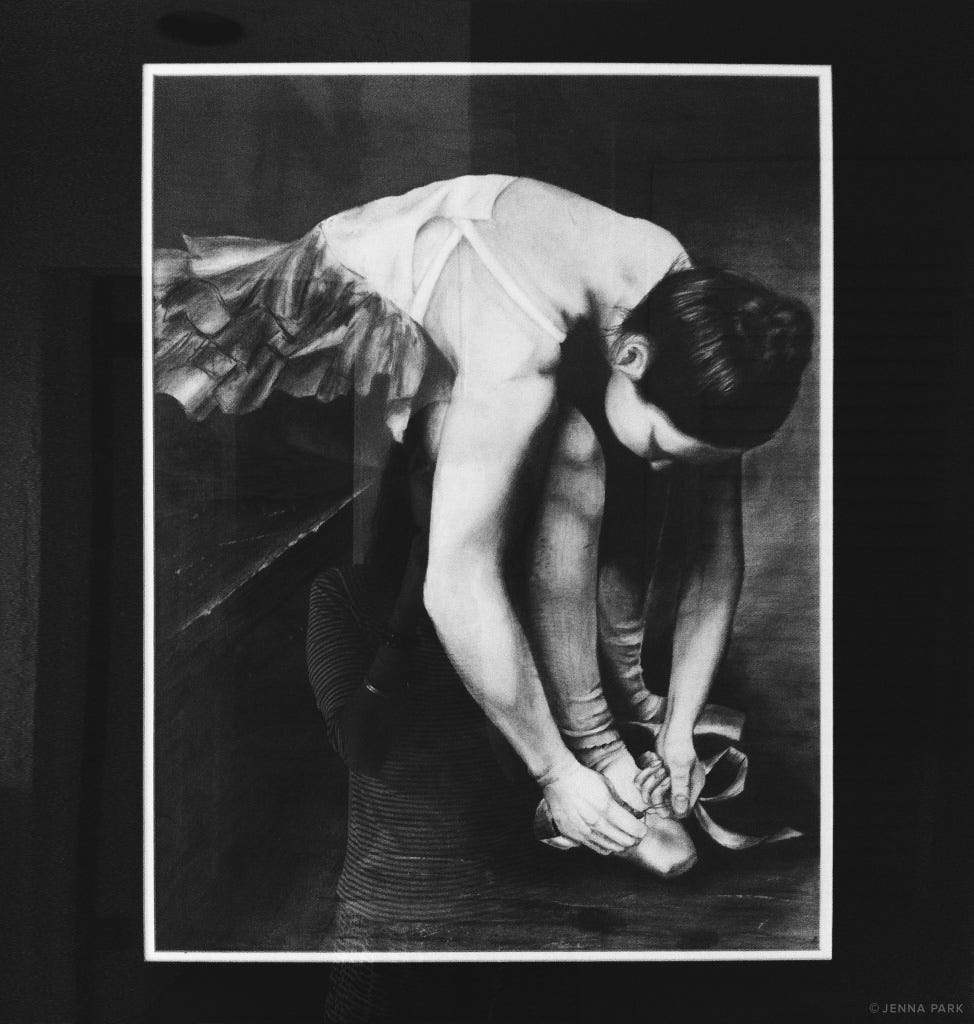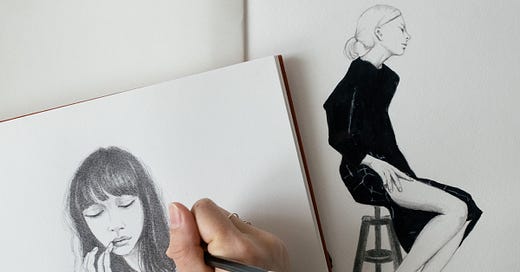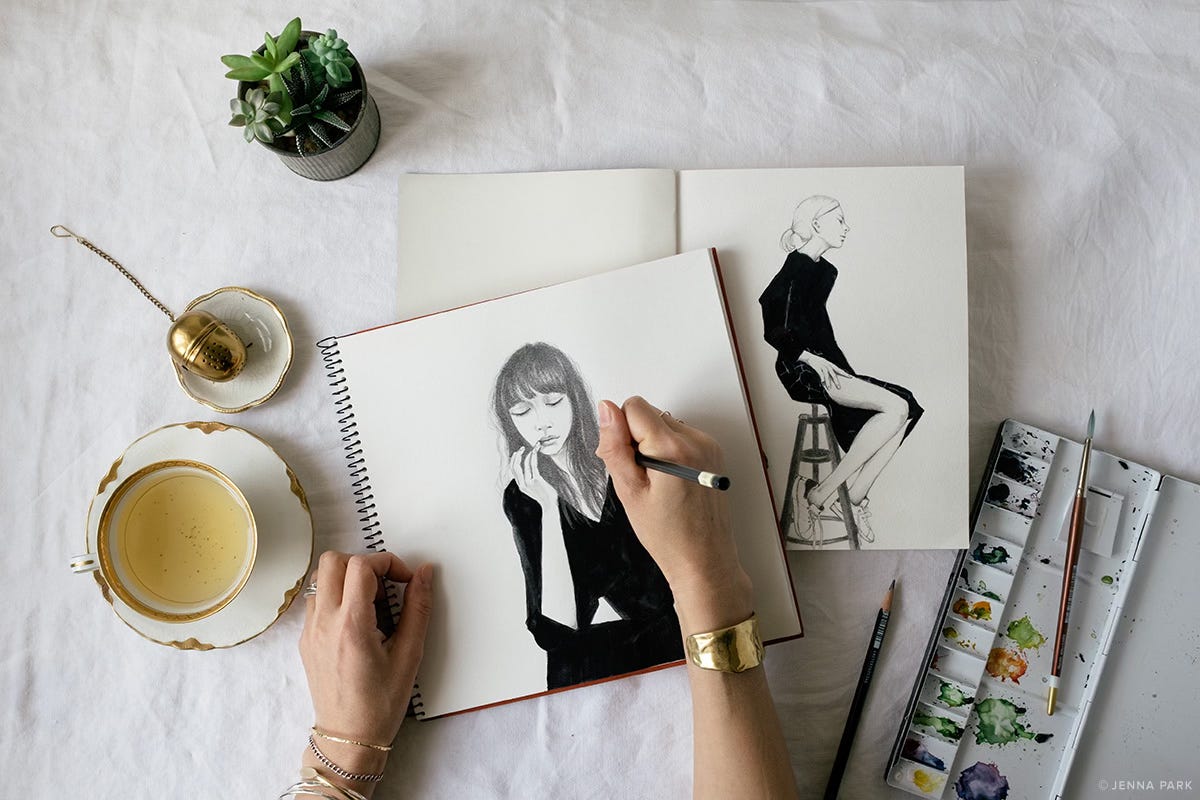What does it mean to be an artist?
Dreams vs. reality, art vs. craft, and rhapsodizing the romantic myth of being an artist.
Rhapsodizing a romantic myth
I’m not really sure what I expected six months ago when I declared that I was done with my career in order to focus on art. I think I had some vague visions in my head of spending 4–6 hours a day noodling around in a sketchbook while making steady, but measurable progress on a larger, more ambitious piece of conceptual artwork.
In my aspirational dreams of semi-retirement, I spend my days getting lost in quick paint studies on small canvases, sifting through piles of saved papers and ephemera for collage work, strolling through forests (or city parks) hunting for natural specimens to pin on my workspace wall for inspiration. I regularly visit galleries and museums. I read about art and consume books. I envision this life of prolific creativity and settle deep into a meaningful body of work that I can lose myself in for years.
Those are the dreams.
The reality is much different.
While I have been doing some of those things over the lasts six months, my life as an artist—or whatever I envisioned it post-career—is still in flux and still being defined. I realize that this period is yet another transitional phase, but it has me questioning whether my life will ever resemble that romanticized ideal. Also, does it matter? (no)
I’ve been asked by quite a few people who are curious about leaving their careers what I do with my time now. The answer is that it isn’t really all that different from a year ago, believe it or not. What I’ve learned is that it’s not enough to clear obstacles from your life to make space for personal work. It also requires deliberate intention and disciplined effort. As it stands, there are still too many obligations that compete for my time. When you live a busy life, like most of us do, we constantly shuffle and prioritize tasks that require our attention, but something always ends up getting sidelined. Without intention and discipline, the space I carve just gets filled with more of life’s demands.
A few weeks ago, I reflected on feeling like life was finally breaking free of stagnation. Decisions and answers allowed me to plan, make travel arrangements, and proceed with important matters for our household. When I finally had time to catch my breath, however, I realized that this movement forward primarily centered around family life rather than my own personal development. I’m still as stuck about my creative work as I ever was. Getting “unstuck” and gaining clarity aren’t necessary the same things. All this to say, I have not been spending 4-6 hours on making art and I’m not any closer to clarifying what I want to work on.

I recognize that the type of work that I am managing to do—filling a sketchbook with drawings for the sake of practicing the craft—is still worthy and I’m charting progress. But deeper thinking around any kind of meaningful and conceptual work requires way more mental head space than I gave it credit for.
Art versus craft
And this is the crux of what I’ve been questioning my entire artistic life since I struggled to find my calling in art school: art isn’t necessarily about the mastery of technique or the craft. It’s the ability to express, interpret, and think differently in order to make sense of our world; to capture what’s in our imaginations and to put forth that beauty. Art acts as a catalyst for emotion and discussion.
Being an artist means that you have the skill of observation and you can see things that often go unseen. Some of this requires the quietness of the mind and the luxury of time to stare at a canvas, out the window, out into space. This part is still challenging when you have other obligations.
In art school, even as young 18 and 19 year olds, my classmates and I would engage in discussions debating the fine line between art and craft. Every year at my conservatory-style school, a percentage of my classmates would drop out after what was notoriously known as the “bootcamp” of freshman year. Our academic schedule consisted of nine courses each semester, six of which were studio art classes. It was intense. As students, we would regularly endure hours-long critiques picking apart everything from composition to the work’s intentions. After a semester, some of my classmates realized that they just wanted to make things—ceramics, glassblowing, jewelry—and decided that the fine art world wasn’t really right for them.
I think about this a lot. This is why I struggled and left after three years. It’s why I still struggle now.
I mean, who the hell cares, right? The line between art vs. craft is blurry at best. Ultimately, it serves little purpose to engage in this debate, aside from providing fodder for late-night discussions among teenagers who were trying to define themselves within the art world. If you create, you can call yourself an artist—end of story.
And yet…I know I internalize and overanalyze a lot of this nonsense, but I also know that my art school training has left me with some baggage about what I think being an artist means and how I define art vs. craft for myself. The art world is rooted in elitism and classism. Intellectual vs. functional. Ideas vs. technique. I’ve since been dismantling the cultural baggage of how museums and the gatekeepers decide what is high art.
I have no idea why this stuff still hangs over me. I try to focus on the joy and the visceral satisfaction of gliding a piece of charcoal across paper, of being able to render textures with variable strokes, dimension and volume with the push and pull of pigment. I revel in the fact that it’s become a form of stress relief. That should be reason enough to continue, but in the back of my head I hear a small voice from those art school days that’s been drilled into my head, but what does it mean?
Productivity versus a calling
I will admit that I make a lot of excuses for my lack of creative output even if some of the excuses are valid—like not having a dedicated space to spread out in my NYC apartment to make a mess. Would I be more prolific and motivated if I had a studio space where I can leave the mess behind everyday? Would it light a fire under me if it was a space that I paid monthly rent for? Or am I attracted to this idea of a studio because it allows me to fantasize about an unrealized childhood dream of being an artist? The truth is, I have no idea if this would make a difference because I have never had a dedicated space to work in before.
Limitations of space aside, I thought I would have greater mental capacity once my kids reached adulthood, but that hasn’t quite manifested yet either. I am still playing the role of mentor, advisor, academic and career coach.
I remember when my oldest kid turned 18, thinking that it was surreal that my job of raising kids was nearly done. At 18, I had done all I could to raise her to be a conscientious and kind human being; from that point on, it was all on her. I realize now, two years later, how premature that thinking was. I mean, in one sense this is true, but modern parenting doesn’t necessarily stop at 18 or when kids go to college. I find myself still deep in the parenting mindset that admittedly takes up a lot of my mental energy right now. Maybe this will change when my youngest leaves in five months, but it may not. I guess it’s true that you never really stop being a parent.
Above all, my biggest fear is discovering that at the end of all of this soul searching, art may not even be my calling after all. Maybe when I stepped away from it 34 years ago I unearthed a truth buried somewhere deep inside. It’s possible I clung onto that artist dream because that was my childhood identity for so long. I didn’t know who else I was. But if my calling is not art, then what is? It isn’t design. Maybe I haven’t even found it yet.
I think the most surprising thing to come out of all this self-reflection is that I’m open to that possibility now too.
Links I found interesting this week
Looking for a late-night meal? America’s closed (CNN)
Speaking of college days, going to 24 hour diners late at night after long days in school or after shows defined some of my most fond college memories. In NYC, we often went to The Kiev, a Ukrainian diner where we often shared a plate of pierogis and bowls of mushroom barley soup. I didn’t realize that the era of 24-hour diners was in jeopardy.The solar eclipse is over! Here's what to do with your eclipse glasses (space.com)
Did you catch the eclipse on Monday? If so, you can recycle your glasses to be collected and delivered to underserved communities and schools. Warby Parker will take them if you’re near a location!Loneliness can kill, and new research shows middle-aged Americans are particularly vulnerable (The Conversation)
"Other nations, such as the U.K. and Japan, have appointed ministers of loneliness to ensure relationships and loneliness are considered in policymaking.” Wow.The Mr. Beastification of entertainment (Vox)
Yep, count me in as someone who doesn’t really get the appeal of Mr. Beast videos, but his story is pretty interesting and I didn’t know that he employs 500 people!






After moving to an apartment closer to my work, I thought I'd have more free time at hand. But somehow I find ways to fill it all up again, and it does take a lot of planning and discipline to carve out time for the things that I want to dedicate time too.
Also, I first thought your painting was a photograph because it looked so real! I love it so much!
Two things:
1. I've never studied a craft but have moderate talent at a few things -- some, but clearly not enough to ever pursue it seriously (both in my own and others' estimations). In that space, I've found freedom, because when I need to process some thoughts or feelings, I often make something that helps me.
Lately I've felt the urge to embroider when I feel something in my head that I need to work through. Sometimes I share it, but honestly, it's for me; I'm the main and only audience that matters to myself, and if anyone else shares their opinion on it or attaches any value to it... it almost angers me? Like, it feels irrelevant, because it wasn't for them. I wonder if there's something there about being an artist vs. a craftsperson where an artist feels like what they're trying to express is not just for themselves, but really does need to connect with a wider audience.
2. And to that point, I wanted to reflect back on you that I very much consider you a writer.
Especially in this newsletter, you write to distill truths that connect with a wider audience, and I think you're very successful in that goal. Consistently in these newsletters, you hit upon something that makes me think and reflect on my own journey. That's something a writer does, and as I've been figuring out my own path this past year or so, your writing has been a welcome voice in that mix -- sometimes as guidance, sometimes as solidarity -- but always with something that connects.